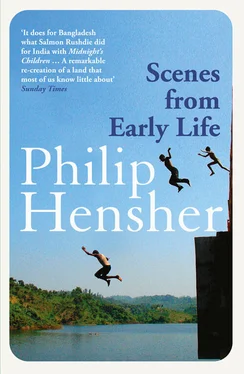‘I am so sorry about my husband,’ Mrs Khandekar said, smiling. ‘He is always in such a rush. But perhaps I can help you? You are an old friend of Mr Khandekar’s father, I think?’
Altaf explained. Standing at the door to Mrs Khandekar’s sitting room, he found it came out in a much more orderly way. Amit’s problem seemed to unfold to an easy, elegant, listening audience. Amit stood, listening to Altaf’s explanation with a furrowed brow.
When Altaf had finished, Mrs Khandekar said, ‘I see. It happens to many people, that sort of thing. But do you think your friend’s landlord is at all likely to change his mind? He sounds quite set in his decision.’
‘He doesn’t want me to stay in the flat,’ Amit said, speaking for the first time. ‘I’m sure he has his own good reasons.’
‘I don’t think anyone can force him to rent his flat to someone, once he has made his mind up,’ Mrs Khandekar said. ‘It is unfortunate, but there it is.’
She looked at them, levelly and not without kindness.
‘I’m sorry to have troubled you in your home,’ Altaf said after a moment, lowering his head.
‘But what would you hope for, at the end of all this?’ Mrs Khandekar said. ‘Don’t think about how you would achieve it but what you actually want.’
‘Somewhere to live,’ Altaf said. ‘Merely somewhere to live.’
‘Mrs Khandekar,’ the girl in the pink sitting room said – her voice was low and melodious, and she had an air of adult confidence about her. ‘Excuse me, Mrs Khandekar. What about—’
‘This is Nadira,’ Mrs Khandekar said. ‘The daughter of a very old friend of my husband’s, come to visit and take a cup of tea in the morning. It is so kind of her to drop in like this.’
Altaf and Amit bowed in her direction. ‘And now,’ Mrs Khandekar said, ‘I wonder if the best thing for me to do is not to start telling you about lawyers and law courts and the laws relating to landlords and their tenants, but just to try to help you to find somewhere to live. After all, that is all you want, I believe?’
‘That was just what I was going to say,’ the girl said.
Mrs Khandekar, she said, owned a block of flats in Old Dacca. They had belonged to her father before her, and he had left them to her. They were nice flats – a little old-fashioned, perhaps, but in good order, well looked after and in a very respectable, quiet neighbourhood.
‘What are your professions, gentlemen?’ Mrs Khandekar said.
Altaf let Amit say, ‘Schoolmaster,’ which at least sounded regular and respectable.
Somehow, it seemed to be established in Mrs Khandekar’s mind that the two of them were looking for a flat together, and he found himself saying, ‘I am a musician,’ adding for good measure, ‘I play on the radio,’ and going on to explain the Saturday-evening programme on which he was a regular.
‘How delightful!’ Mrs Khandekar said, with real warmth, clapping her hands together in pleasure. ‘My husband and I never miss it. We must listen out for you.’ She used an English expression.
There were some landlords who would be put off by the idea of musicians, but Mrs Khandekar was not one of them. In fact, once she had discovered that Amit was not just a schoolmaster but also a musician – ‘A famous musician,’ she flatteringly said – it appeared to act as a recommendation and a passport. She asked them into her sitting room, and offered them a seat and a cup of tea. Before long, it had emerged that Nadira, the assured and dignified girl on the sofa, liked to sing and, after a little more conversation, they had agreed to come to her house to teach her, the next free afternoon. In half an hour, everything seemed to have been arranged, and Mrs Khandekar had told them where to meet her the next morning to look at a flat in the block that had become vacant in recent weeks. ‘It is rather small, I am afraid,’ she said apologetically. ‘You must say at once if it does not suit you.’
But of course it would suit them. Altaf thought of his bedroom at home, with the rosewood harmonium placed beyond his brothers’ reach, the noise and the stolen half-hours between hours of chaos. He thought of a door that he could close and a life of his own. Amit’s face showed that, from the beginning, he had considered Altaf a part of his plans for living. Altaf’s heart swelled at the kindness of his friend, and at the degree of understanding between them that went without words.

7.
‘I’ve been to see the hall at the university,’ Altaf said.
It was a year later, and they had been very happily ensconced in Mrs Khandekar’s apartment, just the two of them. It suited them perfectly. It was on the third floor of an old building, and the streets that ran in front of and to the side of it were quiet ones. This was in the furniture-makers’ quarter, and all day long the streets were crowded with bed frames, like brown grazing cows. The smell of wood-shavings perfumed the air; the day was filled with the sounds of honest labour. In the corner of the sitting room, Amit’s mattress was rolled up and tied: he unrolled it every night when Altaf went to the bedroom. The flat was quite dark, with its small windows, but it suited them both and they were happy there. The musical instruments and the copies of music, including ‘Githo Bitan’ by Tagore, were on a shelf in the bedroom. In the sitting room there was a radio they had bought together, which they referred to as ‘our radio’. They had always battened on to the radios of others – an aunt’s, a mother’s – and it was a pleasure to share one instead. There was a portrait of Tagore tacked to the wall of the sitting room, and in each room, a kerosene lamp for when, as now, the electricity failed. Altaf and Amit were sitting by the light of the kerosene lamp on the floor of their small apartment. Mrs Khandekar’s apartment had a table, but they often preferred to sit on the floor to eat. Before them, lay plates of rice, fish and dal, cooked by Amit on the kerosene stove. Altaf and Amit were steadily rolling up the food into balls with the fingers of one hand, and eating them in one gulp. Their dark fingers glistened in the warm light with grains of rice.
‘What hall?’ Amit said, after a pause.
‘It will be for singers, for writers, for scholars like the professor, and for musicians. It can be a place for everyone to meet, and for people to share their knowledge of the Bengali traditions. It will be wonderful, Amit. There are so many people who are interested.’
Amit stopped. ‘They won’t permit it,’ he said. ‘The government.’
‘They won’t have any choice,’ Altaf said.
‘They tried to make everyone write in their script,’ Amit said. ‘They’ll try again. They don’t like us singing our own songs. They’ll respond if Bengalis start gathering to sing their songs and read their poetry and show their paintings.’
‘They needn’t know anything about it,’ Altaf said, with bravado.
‘Oh, yes?’ Amit said, quite mildly. ‘Do you think there’s nobody at the university in the pay of the police? They probably already know about the whole plan.’
‘Well,’ Altaf said, ‘if they already know, we might as well continue with it.’
‘Oh, yes,’ Amit said. ‘We might as well continue.’
This conversation took place just when memories of previous suppressions were fading, and people like Altaf and Amit were making their plans.
Nadira, who was my Nadira-aunty, had been taking music lessons from them for a year, ever since they had met her at Mrs Khandekar’s house. There was even talk of Nadira going on the radio and singing with them, on a Saturday afternoon. They sang classic songs, and read Bengali poetry together, and loaned each other novels in Bengali. There were classics, and new novels: everyone adored Sangshaptak when it came out, and soon Shahidullah Kaiser was a regular presence at the little group. After a few weeks, Nadira had introduced the two musicians to her sisters and even to her smallest brother, the eight-year-old Pultoo; after a few weeks more, her father – my nana – came in and greeted them. There was always a great respect for culture in my family, and from the beginning, Nana and Nani treated Nadira’s music teachers not as servants and lowly tutors, although of course they were paid to come, but as honoured guests.
Читать дальше













